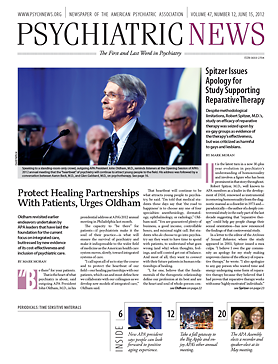Lundbeck’s AA21004 Improves MDD Symptoms in the Elderly
Data presented by Lundbeck and by Takeda Pharmaceutical Global Research and Development Center demonstrated significant improvements in overall symptoms of depression in elderly patients taking Lu AA21004, an investigational multimodal antidepressant for the treatment of major depressive disorder (MDD).
According to study results, elderly patients taking Lu AA21004 5mg/day showed a significantly greater improvement on the Hamilton Rating Scale for Depression compared with those taking a placebo. The study also included exploratory secondary endpoints evaluating select aspects of cognitive function. Patients on Lu AA21004 exhibited improvements from baseline compared with placebo on the Digit Symbol Substitution Test, a measure of processing speed, visuospatial attention, executive function, and working memory; and on the Rey Auditory Verbal Learning Task (RAVLT), a measure of verbal learning, including recall and recognition.
Some Antipsychotic Cotreatments Improve Cardiometabolic Outcomes
Researchers at the Albert Einstein College of Medicine presented results of a meta-analysis of eight randomized, placebo-controlled trials (n=786) in which antipsychotic cotreatments (APC) were used to investigate the cardiometabolic effects of specific APC. Primary outcome was change in weight or BMI. Secondary outcomes included other cardiometabolic and psychopathology parameters.
Compared with placebo, adding aripiprazole to clozapine or olanzapine was the only APC associated with significant weight loss and significant reduction in total cholesterol, but not of HDL-cholesterol or glucose. No significant cardiometabolic effects were found with risperidone or fluphenazine augmentation of clozapine, aripiprazole augmentation of quetiapine or risperidone, or with aripiprazole augmentation of haloperidol. No significant changes were found regarding total psychopathology, positive symptoms, or negative symptoms with any APC.
Side effects were not significantly different between placebo and APC, except for significant prolactin decrease when adding aripiprazole to clozapine or quetiapine/risperidone; adding risperidone to clozapine raised prolactin significantly.
The researchers concluded that specific APCs differ in their cardiometabolic safety. Short-term addition of aripiprazole to a high metabolic risk antipsychotic (olanzapine, clozapine), but not to a medium risk (quetiapine, risperidone) or low risk (haloperidol) antipsychotic significantly improved body weight and lipid parameters. Adding risperidone or fluphenazine to clozapine did not have any beneficial effect, and none of the combinations benefited or worsened psycho-pathology or short-term adverse effects, except for increased prolactin when adding risperidone to clozapine, while aripiprazole added to clozapine, quetiapine, or risperidone lowered prolactin.
Seizure Drug Can Increase Behavioral Disturbances
The antiepileptic drug levetiracetam, used for multiple types of seizure disorders in adults and children, has been reported to cause behavioral disturbances. A meta-analysis was undertaken to identify adverse psychiatric events associated with levetiracetam. Medline search and review of bibliographies were used to identify randomized, controlled trials and other reports for adverse psychiatric events associated with the drug, using the key words psychosis, depression, agitation, and hostility. The studies analyzed were case reports, open-label studies, and randomized, controlled trials. Only studies in which levetiracetam was used to treat epilepsy and in which tolerability was reported were selected.
Of the 1,457 studies found, 59 were selected for analysis after exclusion criteria were applied. These reports gave data on a total of 5,812 patients (928 children and 4,884 adults). Among the studies reporting adverse psychiatric events, six cases described psychosis in children, and 26 cases described psychosis in adults. Depression was reported in 12 cases describing children and in 119 cases describing adults. The major difference was in the number of cases reporting agitation and hostility: 160 in children and 216 in adults.
Not all studies provided information on gender distribution, but when the information was reported, the trend showed a higher prevalence of adverse psychiatric events in males.
The researchers concluded that the rates of psychiatric disorders in patients with epilepsy vary tremendously from 19 percent in population-based studies to 80 percent in neurosurgical patients who have epilepsy, with mood disorders being the most common psychiatric condition. The analysis suggests that the overall prevalence of adverse psychiatric events is 9.26 percent, with a much higher prevalence in children than in adults (19.2 percent versus 7.3 percent).
Risperidone Injection Delays Recurrence of Mood Episode
Janssen Scientific Affairs reported the results of an analysis evaluating the role of risperidone long-acting injection (RLAI) as a maintenance treatment in subjects recently diagnosed with bipolar I disorder.
A post-hoc subgroup analysis of a randomized, double-blind study of RLAI monotherapy vs. placebo in the maintenance treatment assessed subjects recently diagnosed (<=5 years since diagnosis) or chronically ill (>5 years). Subjects who maintained response to RLAI for at least 26 weeks in an open-label stabilization phase were randomized 1:1 to placebo injections or RLAI (at open-label response dose) for up to 24 months.
RLAI significantly delayed the time to recurrence of a mood episode compared with placebo in both recently diagnosed and chronically ill subjects with bipolar I disorder. Placebo data suggested recently diagnosed subjects may perform worse during treatment withdrawal than chronically ill subjects.
Lurasidone Monotherapy Reduces Symptoms of Bipolar I Depression
Researchers associated with Sunovion Pharmaceuticals reported the results of a study to evaluate the efficacy and safety of lurasidone, flexibly dosed at 20-60 mg/day or 80-120 mg/day, in the treatment of major depressive episodes in patients with bipolar I disorder without psychotic features.
Subjects meeting DSM-IV-TR criteria for bipolar I depression, with or without rapid cycling, with a Montgomery Asberg Depression Rating Scale (MADRS) score ≥20 and a Young Mania Rating Scale score ≤12, were randomized to six weeks of once-daily, double-blind treatment with either lurasidone 20-60 mg, lurasidone 80-120 mg, or placebo.
Lurasidone treatment resulted in significantly greater MADRS score reduction at a week 6 endpoint for both treatment groups compared with the placebo group. Discontinuation rates due to adverse events for lurasidone at both dosage ranges were similar to placebo.
The researchers concluded that mono-therapy with lurasidone significantly reduced depressive symptoms in patients with bipolar I depression. Lurasidone treatment also significantly improved anxiety, self-rated quality of life, and ability to function. Tolerability and safety of lurasidone was consistent with results of previous studies in schizophrenia patients.

